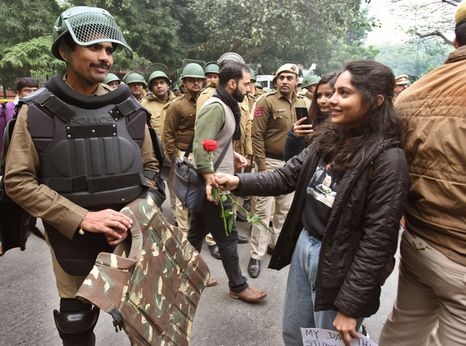Protestors arrested for opposing bigoted law

Safoora Zargar, a research student from Jamia Millia University, Meeran Haider, a member of the Jamia Coordination Committee (JCC) and Shifa-Ur-Rehman, the President of the Jamia Millia Islamia Alumni Association are accused of being ‘key conspirators’ in the February 2020 Delhi riots. They were arrested by the Delhi Police on 10 April, 2 April and 24 April respectively and subsequently booked under the Unlawful Activities (Prevention) Act (UAPA).
Safoora’s pregnancy is a mitigating factor against her continued detention under UAPA, particularly amidst the COVID-19 pandemic. The United Nations Rules for the Treatment of Women Prisoners and Non-Custodial Measures for Women Offenders, also known as the Bangkok Rules, recommend that while deciding on pre-trial measures, non-custodial alternatives should be preferred for pregnant women where possible and appropriate.
On 22 February, several peaceful protesters occupied a portion of the road near the Jaffrabad Metro station in north-eastern part of New Delhi to protest against the Citizenship (Amendment) Act. A day later, Kapil Mishra - a Bharatiya Janata Party (BJP) leader - made provocative speeches and gave Delhi police a three-day ultimatum to remove the protesters. Shortly after Mishra’s speech, riots broke out and attacks by a Hindu mob on Muslims resulted in at least 50 deaths.
During the riots, verified videos of police officers pelting stones and beating young Muslims surfaced. In one such video, the police officers forced the men to sing the national anthem as they begged the police officers to stop. One of the men later died of the injuries.
While peaceful protesters face arbitrary detention under draconian laws, the allegations of excessive force against protesters during the CAA protests and subsequent riots which resulted in a number of deaths, as also pointed out in the communication by Special Rapporteurs dated 28 February 2020 to the Government of India, remain to be investigated.
The Citizenship (Amendment) Act, enacted in December 2019, legitimises discrimination on the basis of religion and stands in clear violation of the Constitution of India and international human rights law. The Act while inclusionary in its stated objective, is exclusionary in its structure and intent. It amends the Citizenship Act of 1955 to enable irregular migrants to acquire Indian citizenship through naturalisation and registration. However, it restricts the eligibility to only Hindus, Sikhs, Buddhists, Jains, Parsis and Christians from Afghanistan, Bangladesh and Pakistan who entered India on or before 31 December 2014. The Act also reduces the requirement of residence in India for citizenship by naturalisation from 11 years to 5 years for these particular communities.
The CAA stands in violation of the right to equality before the law and right to non-discrimination as guaranteed under the International Covenant on Civil and Political Rights and International Covenant on Economic, Social and Cultural Rights, to which India is a state party.
The Unlawful Activities (Prevention) Act (UAPA)is routinely used by the government to bypass human rights and stifle dissent. In 2018, the conviction rate under UAPA was 27% while 93% of the cases remained pending in the court. It is a mere tool of harassment that the government uses to harass, intimidate and imprison those who are critical of the government. The slow investigative processes and extremely stringent bail provisions under UAPA ensure that they are locked up for years altogether, creating a convenient setting for unlawful detention and torture.